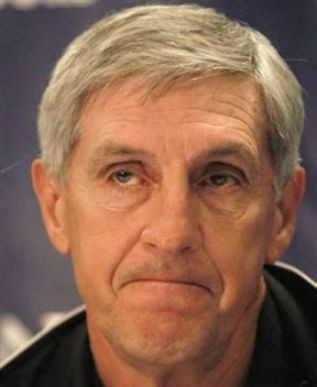The feel-good story of the fledgling NBA season has got to be the Utah Jazz. Thier 9-1 opening ties a team record, and with their next opponent being Toronto, the Jazz are all but guaranteed their best start in franchise history. Not bad for a team that went from a perennial contender in the West to an injury-plagued chemistry nightmare, seemingly overnight.

Nobody deserves to win more than Jerry Sloan. If victories were based on merit, Sloan would be much higher on the list of the winningest coaches of all time (he's 8th). A throwback to a different era of the NBA, Sloan was deemed by many to be too "old-school" to relate to today's young players. Somehow, Sloan and VP of Player Development Kevin O'Connor have managed to assemble a young roster that will not only listen, but will play hard and compete.
Its not shocking to realize how Sloan turned things around. He has always been able to maximize the performances of mediocre players, taking teams deep into the playoffs while relying the likes of Thurl Bailey, Bryon Russell, Howard Eisley, Greg Ostertag, Adam Keefe and Jarron Collins for major contributions. Kirilenko, Boozer and Okur are much better than any frontcourt tandem Utah previously offered. None of them possess the all-around skill of Karl Malone, but with AK-47, Booz and Memo on the court together, they present a host of matchup problems for most NBA teams. Not to mention that the trio average 46.4 points and 27.9 rebounds and are a major reason the Jazz are favored to win the Northwest division title. They have remarkable chemisty considering that Kirilenko and Boozer have spent more time in the training room over the past two seasons than on the court together (incidentally, Kirilenko is out again).
 The Jazz are deep in the backcourt as well. Deron Williams, selected No. 3 in last years draft, has matured and improved his decision making after spending the summer training with Stockton. Matt Harpring is a determined, physical guard who's game is reminiscent of Sloan's days as a Chicago Bull. In the off-season, Utah added guard Derek Fisher, a sharpshooter who brings championship experience and veteran leadership. They also drafted two rookies: Ronnie Brewer, an athletic wingman to complement Williams' uptempo flair, and Paul Milsap, a no-nonsense frontcourt workhorse. Perhaps the biggest suprise for Utah has been the rapid development of second-year guard C.J. Miles, who played in the NBDL last season but earned a starting spot in training camp this year. Sloan, who is known for keeping young players on the pine, isn't breaking from philosophy. He's playing the youngsters in an effort to build team chemistry, establish a rotation, and help the team escape the shadow of Stockton and Malone.
The Jazz are deep in the backcourt as well. Deron Williams, selected No. 3 in last years draft, has matured and improved his decision making after spending the summer training with Stockton. Matt Harpring is a determined, physical guard who's game is reminiscent of Sloan's days as a Chicago Bull. In the off-season, Utah added guard Derek Fisher, a sharpshooter who brings championship experience and veteran leadership. They also drafted two rookies: Ronnie Brewer, an athletic wingman to complement Williams' uptempo flair, and Paul Milsap, a no-nonsense frontcourt workhorse. Perhaps the biggest suprise for Utah has been the rapid development of second-year guard C.J. Miles, who played in the NBDL last season but earned a starting spot in training camp this year. Sloan, who is known for keeping young players on the pine, isn't breaking from philosophy. He's playing the youngsters in an effort to build team chemistry, establish a rotation, and help the team escape the shadow of Stockton and Malone.Sloan's system has always been based on tough defense and the high pick-and-roll. With a capable point guard in Williams and a well-balanced frontcourt, Sloan now has a variety of options despite his rather simple offensive game plan. Even if the pick and roll isn't clicking, Williams can make clutch shots, just as he did tonight against Phoenix, hitting the jumpshot that sent the game into overtime. This newly discovered confidence, the swagger, is what has been missing in Utah since Stockton and Malone were removed from the marquee. Although the system and coach have remained the same, this team needed to find its own identity.
 The new, young Jazz look like they're for real, and if they can stay healthy and make the playoffs, Sloan may earn the much-deserved Coach of the Year honors that have eluded him during his long career. It might just be enough to wipe that frozen scowl off his face. Then again, maybe not.
The new, young Jazz look like they're for real, and if they can stay healthy and make the playoffs, Sloan may earn the much-deserved Coach of the Year honors that have eluded him during his long career. It might just be enough to wipe that frozen scowl off his face. Then again, maybe not.

1 comment:
I'm very impressed with Deron Williams this year. You called it last year when you told me he would be better than Paul. That kid's steady as a cornerstone.
And don't soon forget the incalculable (did I just make up a word?) contributions over the years of David Benoit and Chris Antoine Carr!
Post a Comment